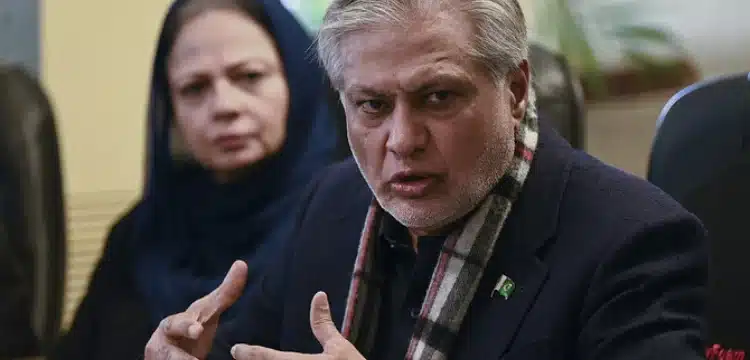[vc_row][vc_column][vc_column_text dp_text_size=”size-4″]According to local media, Pakistan’s Finance Minister Ishaq Dar blamed “geopolitics” for repeated delays in the resumption of Pakistan’s $6.5 billion International Monetary Fund (IMF) programme, hours after the lender criticised Islamabad for failing to extend the tax net in the current budget.
Since late November, the IMF and Pakistani officials have been negotiating to conclude the loan program’s ninth review. However, they have made no progress in assuring the facility’s rebirth, which is slated to expire at the end of June.
Dar presented the budget for the next fiscal year last week, with an outlay of Rs14.46 trillion ($50.4 billion), with the government aiming for a 6.5 percent fiscal deficit and allocating over half of the total to interest payments.
Also Read: Lawyers reject civilian military trials.
Dar responded to the IMF national representative’s criticism of the country’s new federal budget, stating Pakistan was a “sovereign” country that could not accept everything asked by the IMF, according to Pakistan’s Geo News station.
“Pakistan is a sovereign country and cannot accept everything from the IMF,” he said. “Foreign hostile elements want Pakistan to turn into another Sri Lanka, and then the IMF will negotiate with Islamabad.”
The finance minister assured the committee that the government knew how much tax it needed to collect and how it could create money.
According to the report, regarding Pakistan’s external payments, he guaranteed the country that no foreign payments would be deferred.
“Pakistan does not need to go to the Paris Club to reschedule loans,” he declared. “We will manage Pakistan’s external payments.”
Pakistan has been suffering from a severe balance of payment crisis for months, with FX reserves barely enough to cover a month’s imports, inflation rising, and the local currency rapidly weakening.
The South Asian country still needs to borrow $2.5 billion from the IMF, but this remains unknown due to unproductive negotiations and the composition of the most recent budget.
[/vc_column_text][/vc_column][/vc_row]











